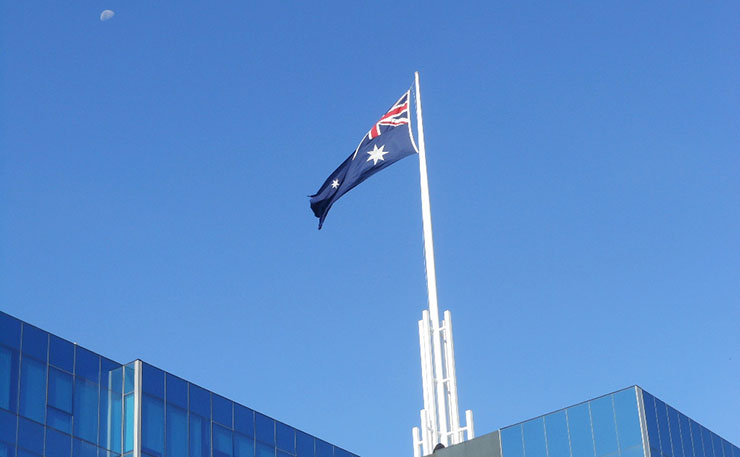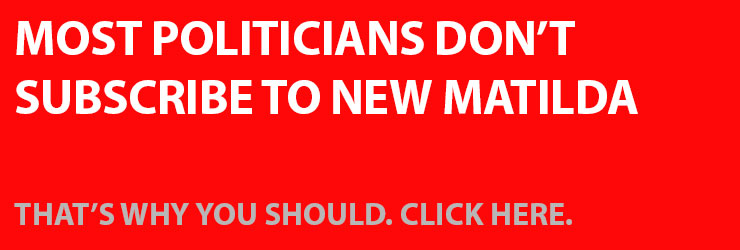ANALYSIS: Malcom Turnbull’s plan to have the states determine income taxes may have been ditched quickly, but it’s far from anomalous to the Coalition’s broader thinking on the issue. Their ‘competitive federalist’ approach risks leaving Australia like the US, where those in the poorest areas have their disadvantage doubled, writes Ian McAuley.
Ben Eltham has written about the idiocy of Turnbull’s idea that states should be able to set their own income tax rates.
Anyone still unconvinced about the destructiveness of interstate tax competition should fly to Los Angeles, rent a car and drive to Boston, making sure they take in Mississippi, Alabama and Tennessee on the way. And in their travels they may meet someone who lives in one of New York’s commuter suburbs in Connecticut or New Jersey who has to pay income taxes in several states at several rates.
That’s tax competition in practice. In the USA, poor states with weak tax bases become even poorer because they’re unable to fund the public services needed in a modern competitive economy. The problem is particularly manifest in school education, because schools are funded by local government taxes. Poor cities have poor schools meaning education gaps and therefore income gaps go on widening.
It’s easy to see Turnbull’s idea as some thought bubble – was he overtired, had he picked up some recreational substance from King’s Cross, was it planned as an April Fool joke for last Friday’s gathering of premiers and chief ministers?
But its roots are in considered government policy. The 2015 Reform of Federation discussion paper notes, with a hint of disapproval, that among federations Australia stands out for strong centralisation of taxes, with the Commonwealth collecting around 80 per cent of tax revenue. Why can’t we be a bit more like America, where most taxes are collected by state and local governments?
We can go back to the early days of the Abbott Government, which started with a “Commission of Audit”, whose report into federalism, on the subject of tax competition, asserted:
This has the potential to inject further competitive tension within the Federation as States would have the autonomy to set rates and compete amongst themselves.
In other words, tax competition with its attendant race to the bottom and entrenchment of regional disparities is not just some unintended consequence of allowing states to set their own rates. It is an intended consequence, reflecting the ideology of those who believe an emaciated public sector, unable to raise public revenue to fund necessary public services, is unquestionably desirable. On the intrinsic virtue of “small government” Turnbull and Morrison are on a unity ticket with Tony Abbott and Mathias Cormann.
Australia’s Federal History
The world doesn’t have many federations. Some, like Germany and Switzerland, came together as unions of previously autonomous states, with their own distinct cultural traditions. (Switzerland has four regional languages). The USA started as a loose union to fight the War of Independence: in 1777 when the 13 colonies agreed to federate it would have taken at least a week to get a letter from Boston to Philadelphia – in good weather. A loose federation of disconnected and reasonably autonomous states was appropriate at the time.
In 1901, even though communication and transport had improved, federation was about the only sensible way to bring together Australia’s six colonies. In fact, such were the intercolonial differences, that a unitary government would have been out of the question. Then (as now), Western Australia was the state most in favour of going alone. It had avoided the worst of the 1890s depression, and was therefore reluctant to join with more poorly performing eastern colonies. Also, distance was a factor – Perth lacked a rail connection with the eastern capitals until 1917.
So, in spite of our small and increasingly mobile population (3.7 million in 1901), a comparatively homogenous culture and emerging modern communications, we chose federation. But we pragmatically took on many of the fiscal arrangements of a country with a unitary government. It was no coincidence that we called the new nation the Commonwealth of Australia. Not the “Federation” but the “common-wealth”.
Soon after federation, pressure arose for revenue sharing among the states, which saw the Commonwealth Grants Commission established in 1933, charged with advising the Commonwealth on the distribution of general purpose or untied grants to the states, based on the principle that all states (and territories) should have the means to provide the same standard of government services. To this day it operates to allocate the distribution of GST revenue. In 1923 the states and Commonwealth got together to develop the Loan Council, specifically designed to prevent competition in states’ borrowing. And during the Pacific War states handed over their income taxing powers to the Commonwealth. These arrangements make good sense, particularly in a country so dependent on commodity price cycles, which mean regional fortunes can change quickly.
The Future Of The Federation
Of course there are tensions when one level of government raises taxes and another level of government spends them. But the cost of such tension must surely be lower than the cost of destructive tax competition.
Ideology at the Commonwealth level contributes unnecessarily to that tension. State governments, whatever their partisan label, are judged largely on their capacity to deliver services rather than their “left”/“right” ideology. Hospital waiting lists, overcrowded schools, road and public transport congestion, and police response times are issues that matter to state governments. Far right extremism is a luxury reserved for Canberra politicians who don’t have the task of running anything, and who excuse themselves from any understanding of why certain services are best funded or delivered by governments. (Queensland’s Campbell Newman learned this distinction to his cost.) Also, states are responsible for provision of human services – education, care in hospitals, policing – that inevitably employ expensive skilled labour.
The basic problem is that nationally we’re trying to get by with too small a public sector, and unless we are to accumulate an irresponsible level of public debt, we’re collecting too little tax. We already have one of the smallest public sectors of all prosperous developed countries, but are trying to get by with the idea that we cannot increase taxes.
We don’t want tax competition, but we do need more revenue for state government services. States’ own tax bases are weak – they have to rely on inefficient, administratively costly and inequitable taxes. We need a cooperative deal between the states and the Commonwealth to see some rise in Commonwealth income or consumption taxes, a carbon tax, withdrawal of costly superannuation and capital gains tax concessions, and closure of tax rorts such as the use of family trusts, with that revenue shared between the states in the same way as GST revenue is distributed. That’s what Premiers Weatherill and Baird had in mind when they first raised the issue, and Premier Andrews has laid it more starkly on the table – we need more revenue.
Unfortunately, the Commonwealth has tried to close off the matter by re-presenting the Commission of Audit’s proposal to use tax competition as a means to undermine our hard-established mechanisms of interstate cooperation, to allow regional disparities to worsen, and to force states to impoverish our public services – our common wealth.
Donate To New Matilda
New Matilda is a small, independent media outlet. We survive through reader contributions, and never losing a lawsuit. If you got something from this article, giving something back helps us to continue speaking truth to power. Every little bit counts.





